|
Tourism
in India, which till the advent of the high voltage Incredible
India campaign sputtered along incrementally, may finally be hitting
cruise speed; inbound tourists crossed four million for the first
time in 2006. But before you reach out for the bubbly, you may
want to take a reality check-the 4.43 million foreign tourists
who visited India last year are a drop in the ocean when compared
to tourist arrivals in Hong Kong (25.25 million), Malaysia (17.55
million) and Singapore (9.7 million). It's the usual litany of
complaints-limited entry points, limited and overpriced hotel
rooms and high taxes-that squeeze India out of the global market.
But, in the midst of this chaos, a few individuals are charting
out a new course-of tourism that is socially conscious and environmentally
sustainable. Here, we profile a few such entrepreneurs and their
ventures.
Francis Wacziarg (L),
64, & Aman Nath, 56
Co-Chairmen
Neemrana Hotels
TURNOVER: Rs 16 crore
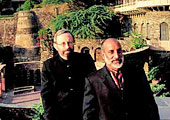 |
| Fort of call: It took Wacziarg and Nath
5 years to restore Neemrana |
In keeping with
their business philosophy of offering heritage vacations at affordable
prices, Nath and Wacziarg will launch Le Colonial Fort in Kochi
in September. The duo, who are best known for their Neemrana Fort
Resort, are also restoring two more properties, The Bungalow on
the Beach in Tranquebar in Tamil Nadu and Rajinder Kothi in Patiala,
that will be launched shortly. The former is in keeping with the
duo's recent focus on the south and the latter will be its first
property in Punjab. How did they start out? It was while driving
down the Delhi-Jaipur highway that Nath and Wacziarg chanced upon
the ruins of the 15th century Neemrana Fort in the early 1980s.
They purchased it for Rs 7 lakh in 1986 and spent the next 5 years
restoring it. "We opened in 1991 with 12 rooms which were
very well received by tourists who wanted to experience India
beyond its cities," says Wacziarg. Today, the 50-room property,
with tariffs starting from Rs 1,600 per room per night, has become
the 12-property group's flagship and showpiece. Wacziarg's pet
angst: "The single window clearance doesn't really exist
in reality and policies can change on the whims and fancies of
an individual," he observes.
Website: www.neemranahotels.com
Samit Sawhny, 35
MD, Barefoot Group
TURNOVER: Rs 4.1 crore
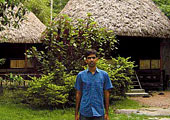 |
| Local flavour: Sawhny plans to open
two more resorts in the Andamans |
An IIM-A graduate,
Sawhny was bitten by the entrepreneurial bug after a stint with
Ernst & Young. "I wanted to do something on my own, though
tourism specifically wasn't on my radar," says Sawhny, who
landed up in Havelock Island in the Andaman islands in January
2002 while compiling a travelogue titled All the World's a Spittoon.
"It was a chicken-and-egg situation-there were no tourists
because there was no infrastructure, which wasn't built because
no tourists ever came," he chuckles. He launched the Barefoot
Group's first resort in Havelock Island in 2004 with an initial
investment of $2 million (Rs 9 crore then). "The name was
chosen to signify an environmentally friendly approach,"
he informs. "For instance, the cottages are built on stilts
so that the water and sand can have a free run," says Sawhny,
who serves only local cuisine. Then, tragedy struck, in the form
of the killer tsunami, on December 26, 2004. "For a year,
we had no tourists and had to cancel all our chartered flights,"
he recalls. However, the tragedy actually proved to be a boon
in disguise. "Havelock was not affected per se; so, it got
us publicity as a resort that was safe," he says. After the
first full year of operations, that saw him welcoming 800, mostly
foreign, couples, Sawhny is now planning to expand his operations
by opening two more resorts in the Andaman islands.
Website: www.barefootindia.com
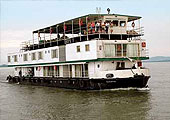 |
| Smooth sailing: Sukapha on the Brahmaputra |
Ashish Phookan, 50
MD, Assam Bengal Navigation and Jungle Travels India
TURNOVER: Rs 10 crore
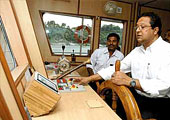 |
| The weather looks fine: Phookan is now
planning cruises from Kolkata to the Farakka barrage |
The idea came
from a tourist, Andrew Brock, who later became Ashish Phookan's
partner. "Brock did some research and realised that there
was no passenger boat in Assam, though they used to ply during
British times," says Phookan. The duo approached the Assam
government for a boat; and were given RV Charaidew, a passenger
and cargo ferry lying idle after 27 years of service on the Brahmaputra,
on a 20-year lease in 2002. "We invested Rs 2 crore on restoring
it and converted it into a 12-room, air-conditioned cruise liner
offering 7-to-21 night packages," he says. After two successful
seasons of operating the Charaidew, Phookan bought a second boat,
rv Sukapha, for Rs 6 crore; the boat has just completed its first
season of operation. "This year, I am taking both boats to
the Hooghly to operate cruises from Kolkata to Farakka from end-July
to end-August," says Phookan, who ferries around 600 tourists
annually; packages typically cost $250 (Rs 10,250) per person
per night for a 8-9 day cruise. Phookan also runs a resort overlooking
the Biphlu river in the Kaziranga National Park.
Website: www.assambengalnavigation.com
Jose Dominic, 56
MD, CGHEarth Hotels
TURNOVER: Rs 70 crore
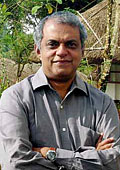 |
| Rustic setting: Dominic involves the
local community in his projects |
Come June, and
Dominic will launch Visalam, a 15-room heritage property in Chettinad
in Tamil Nadu, taking the number of his hotels to 10. Like in
his other properties, this one, too, will weave the local culture
and involve the local community at every step-be it in the architecture,
employment or allied services. The guiding principle also remains
the same: environment first, guests afterwards. He's now a veteran
at this, but in 1988, Dominic entered uncharted waters when he
set up a hotel, Bangaram Island Resort, on Bangaram Island in
Lakshadweep. "Our proposal said 'Keep the island as it is,
don't spoil it with a hotel'," he reminisces. The 30-room
resort has no TV, no room service, no air-conditioning and no
geysers. "Probably for the first time, someone was able to
tell the customer that he was not the king," he says. It
was the land and the locals that came first in order of priority.
Dominic recalls an incident where the General Manager of the resort
discovered a harpoon in the possession of a guest, took it on
the pretext of examining it and then deliberately broke it. Today,
Bangaram plays host to just about 1,000 tourists annually, each
shelling out $350 (Rs 14,350) a day for a life lacking in conventional
luxuries. "However, with a maximum of 30 rooms per hotel,
it is difficult to maintain economies of scale," he says.
Website: www.casinogroupkerala.com
Sanjay Basu, 46
MD, Far Horizon Tours
TURNOVER: Rs 50 crore
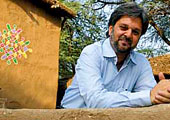 |
| Sun and sand: Basu's Dera Resort is
the world's only resort atop a sand dune |
Basu started
off by organising luxury tented accommodation at various festivals-like
Pushkar in Rajasthan. "The turning point came when we came
across an old wooden boat in Kerala, which we bought and converted
into a houseboat," he says. The Vaikundam, on which he spent
Rs 3 crore, is today the largest houseboat in the Kerala backwaters,
offering 10 rooms at $200 (Rs 8,200) a night. But Basu faced his
greatest challenge in Rajasthan. The Dera Sand Dune Resort, the
world's only resort built atop a sand dune, involved a combination
of building restraining walls and pouring huge quantities of water
in the sand dune to give it stability. Then, water and sandstorms
are the biggest challenges in the desert, which is why the resort
is closed from April to June. "We had to lay 4 km of cables
to get power to the resort," he says. All this cost him Rs
4 crore, which, perhaps, explains the steep tariff of $400 (Rs
16,400) per day. "We will be launching private pool villas
in July 2008 that will be priced at $800 (Rs 32,800) a night,"
says Basu, who is investing an additional Rs 2.5 crore to add
a spa, a bar and another swimming pool. In January 2008, Basu
will unveil mv Mahababu, a luxury cruise liner operating on the
Brahmaputra.
Website:www.farhorizonindia.com
|










